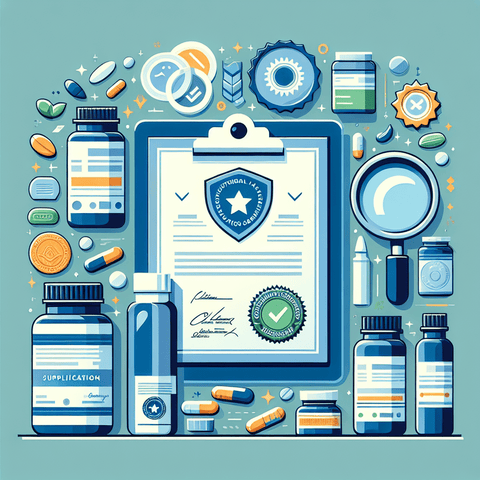Introduction
In an era where health and wellness take center stage, the popularity of nutritional supplements has skyrocketed. Consumers increasingly turn to supplements to fill nutritional gaps, enhance performance, or support overall well-being. However, with this surge in demand comes a proliferation of products that vary widely in quality, safety, and efficacy. Trust and transparency become essential when choosing dietary supplements, especially since many consumers lack the expertise to evaluate product quality critically. This makes recognizing trustworthy certifications an essential skill for responsible consumers aiming to protect their health and make informed choices.
The supplement industry is often scrutinized due to inconsistent manufacturing practices, false marketing claims, and a lack of standardized regulation. Many products advertise enticing benefits or claim compliance with certain standards without proper verification. Consequently, understanding what certifications and seals to look for—and which ones to avoid—can significantly impact consumer safety, efficacy of the supplement, and overall satisfaction. This comprehensive guide will walk you through the essentials of supplement certifications, third-party testing, labeling practices, and how to spot trustworthy products, ultimately empowering you to select supplements with confidence and clarity.
Supplement Certifications: What Are They and Why Do They Matter?
Supplement certifications are official recognitions or seals awarded to products that meet specific standards of quality, safety, and manufacturing practices. They serve as third-party validations, providing consumers with a degree of assurance that the product has undergone rigorous evaluation beyond the manufacturer’s claims. In a landscape with limited strict regulation—especially within the dietary supplement industry—certifications bridge the gap between consumer trust and manufacturer integrity.
These certifications matter because they typically verify critical aspects of a supplement's quality: the accuracy of ingredient claims, absence of harmful contaminants, proper manufacturing practices, and consistency of the product from batch to batch. Certifications like NSF International, USP Verified, and Informed-Choice are recognized benchmarks for quality assurance. They are especially important because dietary supplements are not regulated as strictly as pharmaceutical drugs, meaning that not all products on the market adhere to good manufacturing practices (GMP). Relying solely on marketing claims without certification can lead to unintended health risks from contaminated or mislabeled products.
It is crucial to distinguish between marketing claims and verified certifications. Many brands may tout their products as "professional-grade" or "high-quality" without any third-party validation. Certifications provide an independent stamp of approval that indicates the product has been tested and meets international standards. As a proactive consumer, understanding these distinctions can help you avoid wastage of money on subpar products and protect your health by choosing supplements that pass rigorous quality assessments.
Third-Party Testing: Ensuring Purity, Potency, and Safety in Your Supplements
Third-party testing involves independent organizations evaluating supplement products to verify their purity, potency, and safety, distinguishing them from manufacturer claims or in-house quality checks. Unlike proprietary or self-verified testing, third-party assessments are conducted by external entities with no vested interest in the product’s sales, thus providing an unbiased evaluation of supplement quality.
Leading organizations conducting third-party testing include NSF International, USP (United States Pharmacopeia), and Labdoor. These entities assess ingredients to confirm they match label claims, evaluate for the presence of contaminants like heavy metals or microbial toxins, and verify the absence of undeclared substances. For consumers, selecting a supplement that has undergone third-party testing offers an added layer of protection and confidence, ensuring that the product is safe and efficacious as indicated.
The benefits of choosing third-party tested supplements are numerous: peace of mind, assurance of ingredient accuracy, and reduced risks of contamination. For example, if you're interested in immune-boosting Vitamin C, choosing a product with a Galaxy of the trustworthiness, like [Vitamin C supplements](https://www.topvitamine.com/collections/vitamin-c-benefits-immunity-antioxidant-energy), that has undergone third-party verification ensures you are getting what you expect. Unfortunately, some products may claim certification or testing without proper verification. Consumers should always verify certifications via the organization’s official website or by contacting the certifying body directly.
In essence, third-party testing is the gold standard for supplement validation, and prioritizing products with these credentials significantly reduces the risk of consuming adulterated or ineffective supplements.
Certification Standards: Recognized Benchmarks for Supplement Quality and Integrity
To navigate the maze of supplement claims, understanding the major certification standards is vital. The most reputable standards include NSF/ANSI certifications, USP Verified, and Informed-Choice, each with its own rigorous criteria designed to uphold quality and consumer safety.
NSF International’s NSF/ANSI standards evaluate supplement products on contaminant levels, ingredient verification, and manufacturing practices. Products bearing the NSF Certified for Sport or NSF Certified for Food labels have undergone extensive testing for banned substances, contaminants, and label accuracy. The USP Verified mark ensures that the product has been tested for purity, potency, and proper labeling, according to the strict criteria set by the United States Pharmacopeia. Informed-Choice, predominantly recognized in the sports nutrition arena, certifies that products are free of banned substances and contaminants, especially important for athletes and active individuals.
When comparing these standards, look at the scope of testing and the confidence each provides. For example, a supplement with NSF certification not only verifies ingredient authenticity but also confirms absence of prohibited substances. Similarly, USP’s verification assures consumers of consistent quality across batches. Recognizing these standards helps in making informed choices—opting for brands committed to rigorous quality guarantees and transparent manufacturing practices.
Some reputable brands universally adhere to high certification standards, reflecting their commitment to consumer safety and product excellence. Prioritizing such brands ensures that you’re purchasing products tested against globally recognized benchmarks, reducing the risk of contamination or mislabeling. This vigilance becomes especially crucial when purchasing products like Omega-3s, health boosters, or minerals where purity and potency are vital for health outcomes.
Quality Assurance Programs: Building Confidence Through Rigorous Manufacturing Oversight
Quality Assurance (QA) and Quality Control (QC) are foundational components of trustworthy supplement production. QA encompasses all planned system-wide procedures to ensure that quality standards are maintained throughout manufacturing, while QC involves the operational techniques and activities used to verify that the product meets specified standards.
Notable programs like Good Manufacturing Practices (GMP), mandated by regulatory authorities such as the FDA, set strict guidelines on cleanliness, record-keeping, personnel training, equipment calibration, and batch testing. Products manufactured under GMP conditions are less likely to be contaminated or mislabeled, providing a higher assurance of safety and consistency. Many reputable brands highlight their adherence to GMP on labels or marketing materials, signaling their commitment to rigorous manufacturing protocols.
To identify brands committed to ongoing quality assurance, look for certifications indicating GMP compliance, transparent manufacturing processes, and traceability records. Transparent brands often provide detailed information about their sourcing, testing, and quality oversight protocols, fostering consumer confidence. Choosing products designed and produced under strict QA programs reduces health risks and ensures that the supplement’s composition remains consistent over time.
Consumers can also consult third-party certifiers that evaluate the manufacturer’s quality systems, giving a snapshot of how seriously a brand takes quality assurance. In the long run, investing in brands with transparent processes and robust QA/QC programs ensures the integrity of your supplements and peace of mind about your health investments.
Approved Labeling Practices: Avoiding Misleading Claims and Ensuring Transparency
While product claims can be enticing, they often mask the reality of supplement safety and efficacy. Honest, clear, and compliant labeling adheres to regulatory guidelines and provides the consumer with truthful information about the product. Manufacturers should disclose ingredients, dosages, warning statements, and certification seals transparently.
Common labeling pitfalls include proprietary blends that don’t specify ingredient amounts, vague health claims that imply unproven benefits, or unverified statements designed to mislead. Phrases like “supports immune health” without substantiation can be vague, while unsubstantiated claims such as “cure” or “treat” are often illegal unless supported by scientific evidence. Recognizable labels like "GMP Certified" or "USP Verified" indicate adherence to approved labeling practices and manufacturing standards.
To decode supplement labels, look for transparent ingredient lists, clear serving sizes, and verification seals. Always scrutinize whether the product discloses the exact amounts of active ingredients rather than vague claims or proprietary blends. Verified seals, such as the “USP Verified” mark, give consumers an added layer of confidence. Being attentive to labeling practices helps prevent falling for deceptive marketing tactics and ensures you’re making purchases based on accurate information.
Reliable Supplement Seals: Recognizable Symbols of Trustworthiness and Quality
Supplement seals are visual indicators that a product has undergone independent assessment and meets specific standards for quality and safety. Recognized seals include NSF Certified for Sport, USP Verified Seal, Informed-Sport, and others. These symbols are often found on the product packaging and serve as quick references for consumers to confirm product credibility.
The NSF Certified for Sport seal, for instance, confirms that the supplement has been tested for banned substances, contaminants, and label accuracy—making it ideal for athletes and those concerned about doping violations. The USP Verified Seal signifies adherence to strict manufacturing and ingredient standards, ensuring label accuracy, potency, and safety. The Informed-Sport certification is primarily aimed at sports nutrition products, assuring users that the supplement is free of banned substances.
Obtaining these seals involves a rigorous auditing process, including comprehensive testing of raw materials and finished products. However, counterfeit or fake seals do exist. To verify authenticity, check the certifying organization’s official website or contact the certifier directly. Genuine seals are usually accompanied by a serial number or QR code that consumers can verify online.
Choosing products with reliable seals greatly enhances confidence in the supplement’s quality, and by prioritizing these markers, you help support brands that take transparency and safety seriously. Be cautious of products claiming seals without verification or displaying counterfeit symbols, as these could indicate compromised or substandard products.
What to Avoid When Selecting Nutritional Supplements
Consumers should stay vigilant to avoid pitfalls that could compromise health or lead to ineffective purchases. Red flags include the absence of third-party testing or recognized certification seals, vague or inconsistent ingredient lists, and overly low prices that seem too good to be true. Products lacking proper labeling, with proprietary blends or missing detailed ingredient information, should be approached with suspicion. Additionally, counterfeit or faked certification seals can sometimes appear on substandard products, making verification critical before purchase.
Marketing jargon designed to exploit consumer trust can also be misleading. Claims such as "miracle cure" or "instant health" are often pseudoscientific and lack scientific backing. Always research the brand’s reputation and look for verified certifications or third-party testing credentials—verify these seals directly from the certifying organization’s website or official files. Be wary of products with inconsistent ingredient lists or suspicious pricing, which may indicate adulteration or inferior quality.
Researching brands and their certification status before buying is essential. Consulting trusted resources or healthcare professionals, especially if you have specific health conditions, can help ensure you’re choosing safe, effective supplements. Remember, quality supplements should be transparent, accurately labeled, and backed by independent verification processes to guarantee safety and efficacy.
Practical Tips for Consumers: How to Choose Certified and Reliable Supplements
Being an informed consumer involves developing a checklist that helps evaluate supplement products thoroughly. Start by examining the product label for transparent ingredient disclosure, serving size, and clear dosage information. Verify the presence of reputable certification seals like NSF, USP, or Informed-Choice either visually on the packaging or by checking certification organization websites.
Use online resources to cross-verify certifications—many organizations offer search functions or databases where you can confirm a product’s certification status. Additionally, consult healthcare professionals or registered dietitians for personalized advice based on your health needs. Trusted online sources and reputable brands, like those found on [Vitamin C benefits](https://www.topvitamine.com/collections/vitamin-c-benefits-immunity-antioxidant-energy) or [DHA/EPA Omega-3 supplements](https://www.topvitamine.com/collections/dha-epa-omega-3-supplements), provide a good starting point for safe, certified supplement options.
It is also crucial to stay updated on new regulations or standards introduced within the supplement industry, as these can influence labeling, testing, and certification protocols. Regularly reviewing product labels, staying informed through reputable health and supplement industry news, and consulting professionals can help you make smart, safe choices whenever you purchase supplements.
Conclusion
Choosing reliable nutritional supplements is an investment in your health. Understanding what certifications, seals, and standards to look for saves you from potential scams and ensures that your supplements are safe, potent, and accurately labeled. Prioritizing products with third-party testing, recognized certification standards, and transparent manufacturing practices protects you from contaminants, mislabeling, and false claims.
As a consumer, your role is pivotal in supporting the integrity of the supplement industry by demanding high-quality products and verifying certifications before purchase. By making well-informed decisions, you not only safeguard your health but also promote industry accountability and transparency. Remember, a reputable supplement is one that is tested, certified, and transparently labeled—so always look for these indicators when shopping.
Take the time to select supplements wisely, support brands committed to quality, and enjoy the confidence that comes with knowing you’re making a health-conscious choice.
Q&A Section
Q: What are the most trusted supplement certifications I should look for?
A: The most reputable certifications include NSF Certified for Sport, USP Verified, and Informed-Choice. These seals indicate that the product has undergone rigorous third-party testing for safety, quality, and label accuracy.
Q: How can I verify if a certification seal is legitimate?
A: Check the certifying organization’s official website or contact them directly. Many organizations provide online databases or verification tools where you can input a serial number or scan a QR code to confirm authenticity.
Q: Why is third-party testing important?
A: Third-party testing ensures that the supplement contains what it claims, is free from harmful contaminants, and adheres to safety standards. It provides independent verification that reduces the risk of adulteration or mislabeling.
Q: What should I avoid on supplement labels?
A: Avoid products with proprietary blends that lack ingredient specifics, vague health claims, missing certification seals, and products with suspiciously low prices. Also, be wary of counterfeit seals or labels missing detailed information about sourcing and manufacturing practices.
Q: How do third-party testing and certification standards differ?
A: Third-party testing refers to independent laboratory evaluations of specific products, whereas certification standards such as NSF or USP set comprehensive benchmarks for ingredient verification, contaminant testing, and manufacturing practices that products must meet to earn specific seals.
Important Keywords
- Supplement certifications
- Third-party testing
- GMP certification
- USP Verified
- NSF Certified
- Informed-Choice
- Supplement labels
- Certification seals
- Supplement industry standards
- Health supplement safety



